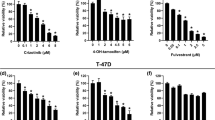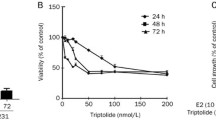Abstract
The function of genistein (GEN) on tumor prevention and tumor promotion is discussed controversially. A possible interference of GEN with chemotherapy has been only rarely addressed so far. In this study, effects of GEN on the anti-tumor activity of cisplatin (CIS) were investigated in the presence and absence of estradiol (10−10 M) in MCF-7 breast and HT-29 colon cancer cells. Cells were treated with graded concentrations of GEN (10−4–10−6 M), E2, CIS and combinations. Cell growth, proliferation and apoptosis were determined as well as the expression level of PCNA, Ki67 and BCL-2 family members. CIS and GEN 10−4 M inhibited cell growth and induced apoptosis in MCF-7 and HT-29 cells in the presence and absence of E2. Co-treatment with CIS and 10−4M GEN resulted in additive effects. In concentrations of 10−5 and 10−6 M, GEN stimulated cell growth in MCF-7 cells. It promoted proliferation, inhibited apoptosis and counteracted the anti-tumor activity of CIS in MCF-7 and HT-29 cells. Particularly the ability of CIS to induce apoptosis was antagonized. In ER alpha-positive MCF-7 cells, but not in ER alpha-negative HT-29 cells, E2 was able to neutralize the anti-CIS effects of GEN. Our data provide evidence that GEN in the absence of E2, a situation which occurs in postmenopausal women, directly affects the anti-tumor activity of cytostatic drugs like CIS. The exact molecular mechanism has to be investigated in future studies.






Similar content being viewed by others
Abbreviations
- CIS:
-
Cisplatin
- GEN:
-
Genistein
- ER:
-
Estrogen receptor
- E2 :
-
Estradiol
- PMSF:
-
Phenylmethanesulfonylfluoride
References
Adjakly M, Ngollo M, Boiteux JP, Bignon YJ, Guy L, Bernard-Gallon D (2013) Genistein and daidzein: different molecular effects on prostate cancer. Anticancer Res 33(1):39–44
Akhdar H, Legendre C, Aninat C, More F (2012) Anticancer drug metabolism: chemotherapy resistance and new therapeutic approaches. In: Paxton J (ed) Topics on drug metabolism. InTech Europe, Rijeka. ISBN:978-953-51-0099-7. doi:10.5772/30015. Available from: http://www.intechopen.com/books/topics-on-drug-metabolism/anticancer-drug-metabolism-chemotherapyresistance-and-new-therapeutic-approaches
Akiyama T, Ishida J, Nakagawa S, Ogawara H, Watanabe S, Itho N, Shibuya M, Fukami Y (1987) Genistein, a specific inhibitor of tyrosine-specific protein kinases. JBC 262(12):5592–5595
Bolca S, Urpi-Sarda M, Blondeel P et al (2010) Disposition of soy isoflavones in normal human breast tissue. Am J Clin Nutr 91(4):976–984. doi:10.3945/ajcn.2009.28854
Chang HC, Churchwell MI, Delclos KB, Newbold RR, Doerge DR (2000) Mass spectrometric determination of Genistein tissue distribution in diet-exposed Sprague-Dawley rats. J Nutr 130(8):1963–1970
Chen WF, Wong MS (2004) Genistein enhances insulin-like growth factor signaling pathway in human breast cancer (MCF-7) cells. J Clin Endocrinol Metab 89(5):2351–2359
Chon HS, Marchion DC, Xiong Y et al (2012) The BCL2 antagonist of cell death pathway influences endometrial cancer cell sensitivity to cisplatin. Gynecol Oncol 124(1):119–124. doi:10.1016/j.ygyno.2011.09.020
Craig WJ (2010) Nutrition concerns and health effects of vegetarian diets. Nutr Clin Pract 25(6):613–620. doi:10.1177/0884533610385707
Degen GH, Janning P, Diel P, Michna H, Bolt HM (2002) Transplacental transfer of the phytoestrogen daidzein in DA/Han rats. Arch Toxicol 76(1):23–29
Dhandayuthapani S, Marimuthu P, Hormann V, Kumi-Diaka J, Rathinavelu A (2013) Induction of apoptosis in HeLa cells via caspase activation by resveratrol and genistein. J Med Food 16(2):139–146. doi:10.1089/jmf2012.0141
Diel P, Smolnikar K, Michna H (1999) The pure antiestrogen ICI 182780 is more effective in the induction of apoptosis and down regulation of BCL-2 than tamoxifen in MCF-7 cells. Breast Cancer Res Treat 58(2):87–97
Drosdzol A, Skrzypulec V, Nowosielski K, Piela B, Rozmus-Warcholinska W, Walaszek A (2004) Phytoestrogens: an alternative to hormonal replacement therapy. Wiad Lek 57(Suppl 1):74–77
Hayashi N, Niikura N, Yamauchi H, Nakamura S, Ueno NT (2013) Adding hormonal therapy to chemotherapy and trastuzumab improves prognosis in patients with hormone receptor-positive and human epidermal growth factor receptor 2-positive primary breast cancer. Breast Cancer Res Treat 137(2):523–531. doi:10.1007/s10549-012-2336-6
Helferich WG, Andrade JE, Hoagland MS (2008) Phytoestrogens and breast cancer: a complex story. Inflammopharmacology 16(5):219–226. doi:10.1007/s10787-008-8020-0
Hsieh TF, Chen CC, Yu AL et al (2013) Androgen receptor decreases the cytotoxic effects of chemotherapeutic drugs in upper urinary tract urothelial carcinoma cells. Oncol Lett 5(4):1325–1330. doi:10.3892/ol.2013.1140
Hwang KA, Kang NH, Yi BR, Lee HR, Park MA, Choi KC (2013) Genistein, a soy phytoestrogen, prevents the growth of BG-1 ovarian cancer cells induced by 17beta-estradiol or bisphenol A via the inhibition of cell cycle progression. Int J Oncol 42(2):733–740. doi:10.3892/ijo.2012.1719
Ju YH, Allred KF, Allred CD, Helferich WG (2006) Genistein stimulates growth of human breast cancer cells in a novel, postmenopausal animal model, with low plasma estradiol concentrations. Carcinogenesis 27(6):1292–1299
Karaca B, Atmaca H, Uzunoglu S, Karabulut B, Sanli UA, Uslu R (2009) Enhancement of taxane-induced cytotoxicity and apoptosis by gossypol in human breast cancer cell line MCF-7. J BUON 14(3):479–485
Köberle B, Tomicic MT, Usanova S, Kaina B (2010) Cisplatin resistance: Preclinical findings and clinical implications. Biochim Biophys Acta 1806(2):172–182. doi:10.1016/j.bbcan.2010.07.004
Korbakis D, Scorilas A (2012) Quantitative expression analysis of the apoptosis-related genes BCL2, BAX and BCL2L12 in gastric adenocarcinoma cells following treatment with the anticancer drugs cisplatin, etoposide and taxol. Tumour Biol 33(3):865–875. doi:10.1007/s13277-011-0313-z
Lagari VS, Levis S (2012) Phytoestrogens for menopausal bone loss and climacteric symptoms. J Steroid Biochem Mol Biol. doi:10.1016/j.jsbmb.2012.12.002
Li H, Tu Z, An L, Qian Z, Achilefu S, Gu Y (2012) Inhibitory effects of ERbeta on proliferation, invasion, and tumor formation of MCF-7 breast cancer cells–prognostication for the use of ERbeta-selective therapy. Pharmaceutical biology 50(7):839–849. doi:10.3109/13880209.2011.637506
Li Y, Meeran SM, Patel SN, Chen H, Hardy TM, Tollefsbol TO (2013) Epigenetic reactivation of estrogen receptor-alpha (ERalpha) by genistein enhances hormonal therapy sensitivity in ERalpha-negative breast cancer. Mol Cancer 12(1):9. doi:10.1186/1476-4598-12-9
Liggins J, Bluck LJ, Runswick S, Atkinson C, Coward WA, Bingham SA (2000) Daidzein and genistein contents of vegetables. British J Nutr 84(5):717–725
Markert A, Thierry V, Kleber M, Behrens M, Engelhardt M (2009) Chemotherapy safety and severe adverse events in cancer patients: strategies to efficiently avoid chemotherapy errors in in- and outpatient treatment. Int J Cancer 124(3):722–728. doi:10.1002/ijc.23991
Maubach J, Bracke ME, Heyerick A, Depypere HT, Serreyn RF, Mareel MM, De Keukeleire D (2003) Quantitation of soy-derived phytoestrogens in human breast tissue and biological fluids by high-performance liquid chromatography. J Chromatogr B Analyt Technol Biomed Life Sci 784(1):137–144
Maubach J, Depypere HT, Goeman J, Van der Eycken J, Heyerick A, Bracke ME, Blondeel P, De Keukeleire D (2004) Distribution of soy-derived phytoestrogens in human breast tissue and biological fluids. Obstet Gynecol 103(5):892–898
Miltyk W, Craciunescu CN, Fischer L, Jeffcoat RA, Koch MA, Lopaczynski W, Mahoney C, Jeffcoat RA, Crowell J, Paglieri J, Zeisel SH (2003) Lack of significant genotoxicity of purified soy isoflavones (genistein, daidzein, and glycitein) in 20 patients with prostate cancer. Am J Clin Nutr 77(4):875–882
Mohammad Javad Mokhtari AA, Hashemi M, Javadi G, Mahdian R, Mehrabi MR, Farhangi A, Mohammadi H (2012) Cisplatin Induces Down Regulation of BCL2 in T47D Breast Cancer Cell Line. Adv Stud Biol 4(1):19–25
Murkies AL, Wilcox G, Davis SR (1998) Clinical review 92: phytoestrogens. J Clin Endocrinol Metab 83(2):297–303. doi:10.1210/jc.83.2.297
Perillo B, Sasso A, Abbondanza C, Palumbo G (2000) 17beta-estradiol inhibits apoptosis in MCF-7 cells, inducing bcl-2 expression via two estrogen-responsive elements present in the coding sequence. Mol Cell Biol 20(8):2890–2901
Qi W, Weber CR, Wasland K, Savkovic SD (2011) Genistein inhibits proliferation of colon cancer cells by attenuating a negative effect of epidermal growth factor on tumor suppressor FOXO3 activity. BMC Cancer 11:219. doi:10.1186/1471-2407-11-219
Rannikko A, Petas A, Rannikko S, Adlercreutz H (2006) Plasma and prostate phytoestrogen concentrations in prostate cancer patients after oral phytoestrogen supplementation. Prostate 66(1):82–87. doi:10.1002/pros.20315
Sarkar FH, Li Y (2006) Using chemopreventive agents to enhance the efficacy of cancer therapy. Cancer Res 66(7):3347–3350. doi:10.1158/0008-5472.can-05-4526
Setchell KD, Zimmer-Nechemias L, Cai J, Heubi JE (1997) Exposure of infants to phyto-oestrogens from soy-based infant formula. Lancet. 5;350(9070):23-27
Shin JI, Shim JH, Kim KH et al (2008) Sensitization of the apoptotic effect of gamma-irradiation in genistein-pretreated CaSki cervical cancer cells. J Microbiol Biotechnol 18(3):523–531
Ullah MF, Ahmad A, Zubair H et al (2011) Soy isoflavone genistein induces cell death in breast cancer cells through mobilization of endogenous copper ions and generation of reactive oxygen species. Mol Nutr Food Res 55(4):553–559. doi:10.1002/mnfr.201000329
van Duursen MB, Nijmeijer SM, de Morree ES, de Jong PC, van den Berg M (2011) Genistein induces breast cancer-associated aromatase and stimulates estrogen-dependent tumor cell growth in in vitro breast cancer model. Toxicology 289(2–3):67–73. doi:10.1016/j.tox.2011.07.005
Wang TT, Sathyamoorthy N, Phang JM (1996) Molecular effects of genistein on estrogen receptor mediated pathways. Carcinogenesis 17(2):271–275
Wang Y, Wang H, Zhang W et al (2013) Genistein Sensitizes Bladder Cancer Cells to HCPT Treatment In Vitro and In Vivo via ATM/NF-kappaB/IKK Pathway-Induced Apoptosis. PLoS ONE 8(1):e50175. doi:10.1371/journal.pone.0050175
Xia J, Duan Q, Ahmad A et al (2012) Genistein inhibits cell growth and induces apoptosis through up-regulation of miR-34a in pancreatic cancer cells. Curr Drug Targets 13(14):1750–1756
Yan GR, Zou FY, Dang BL et al (2012) Genistein-induced mitotic arrest of gastric cancer cells by downregulating KIF20A, a proteomics study. Proteomics 12(14):2391–2399. doi:10.1002/pmic.201100652
Yuan B, Wang L, Jin Y et al (2012) Role of metabolism in the effects of genistein and its phase II conjugates on the growth of human breast cell lines. AAPS J 14(2):329–344. doi:10.1208/s12248-012-9338-5
Acknowledgments
We appreciate DAAD scholarship’s financial support. We thank Raoul Kempkes for his help on the flow cytometry assay and Prof. Pablo Steinberg for supporting with HCEC cells. We also thank Carmen Weigt for reading the manuscript. This study was supported by a grant support from Sino-German Center (No. GZ731) and by International Science and Technology Cooperation Projects (No. 2010DFA31780).
Author information
Authors and Affiliations
Corresponding authors
Rights and permissions
About this article
Cite this article
Hu, XJ., Xie, MY., Kluxen, F.M. et al. Genistein modulates the anti-tumor activity of cisplatin in MCF-7 breast and HT-29 colon cancer cells. Arch Toxicol 88, 625–635 (2014). https://doi.org/10.1007/s00204-013-1184-4
Received:
Accepted:
Published:
Issue Date:
DOI: https://doi.org/10.1007/s00204-013-1184-4




